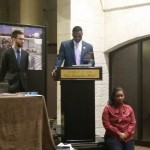 What an amazing morning at Project Change, as we played host to 20 other members of neighboring AmeriCorps programs in Maryland. The energy was palpable and people were truly listening and honoring each others experiences as fellow members of the state of MD AmeriCorps team.
What an amazing morning at Project Change, as we played host to 20 other members of neighboring AmeriCorps programs in Maryland. The energy was palpable and people were truly listening and honoring each others experiences as fellow members of the state of MD AmeriCorps team.
The final story circle was enriched by Kerry who told of the Lessons of the Chainsaw, and how you not only have to face your fears but realize that you cannot mask them either. The instructional video had shown him all the things that can go wrong with a chainsaw, and made him forget about all the things that can go right.
Jose’s story of picking up other people’s trash and wondering why he suddenly cares for this precious world, and how transformative AmeriCorps has been for him. His parting message was to follow your dreams.
Miranda reprised Ben’s story of the 9 year old who was too tough to handle, until Ben learned that this kid had to be tough to survive. He was the head of his house, with no dad, and younger siblings. It was his visit to the nurse to get some tape to tape over a hole in his shoes that gave the story away for Ben and made him see this kid with compassionate eyes.
Chandra shared about the 80 year old grandmother, filling in her naturalization papers, and breaking down and crying when Chandra asked her about her husband. Then the story came out as to how her family had suffered when the USA Military invaded and her applying to become a citizen was, Chandra said, the culmination of a long journey.
Emmanuel said that Africa will get to hear about AmeriCorps and how his work with new immigrants allows him to give back, to share with them what opportunities America offers, that yes, you don’t have to speak English to be an American.
David sharing his time at Howard U and his own quest as a young black man to find his own authentic identity. His work at Einstein and with young people who reminded him of himself was a watershed moment.
STORIES ARE ALL WE HAVE
Stories in the end are all we have. Long after the experiences have gone, long after the one time encounters fade into the mists of memory, all we have is our stories. They are what allow us to carry our lives forward into the future, that account of what we once were, and where we once traveled. They track our journey like a map.
When we live through intense experiences like a service year, we tend to think that the immediacy and the urgency will guarantee the longevity of a deciding moment. But that is not so. We have to consciously harvest our experiences for the memories that we want to turn into stories for us to even recognize that this once was us, in 2015, doing amazing things to serve the community. I shared some of my international experience to relate to all members just how significant and inspiring their service is, and that no one, least of all them, should take it for granted.
Cherish the stories. Honor the stories that honor our purposes and our dreams. That is what we did today at Project Change, and what we will do again to see how the story unfolds.
Thanks to Jira and Ben and Miranda, to Pablo and Tina and Ashley, to Judy and my amazing alums David and Cinthia and Emely, to Cathy for a great lunch, and my 2015 Project Change Team.
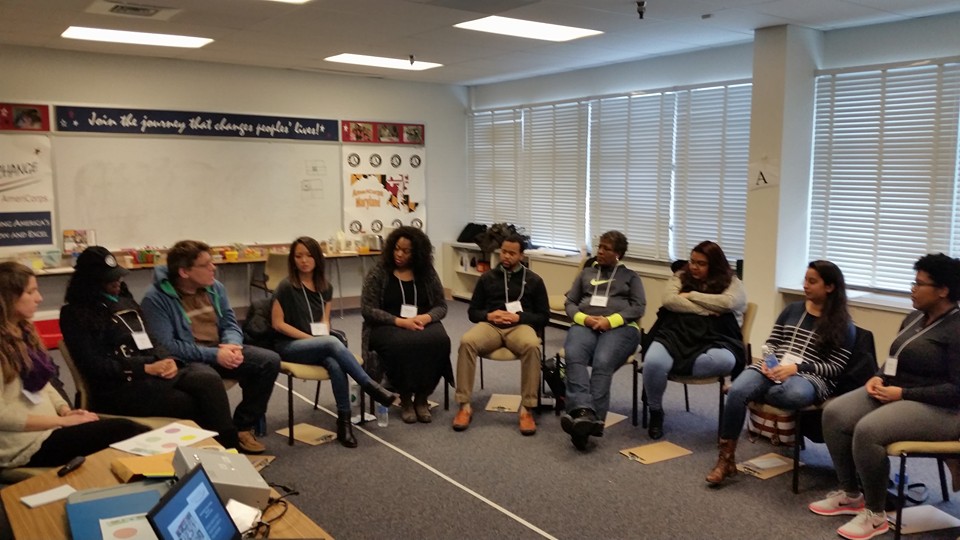 Today the Project CHANGE team met to hear the story of George B Thomas Snr. and how he started the Saturday School, the 6th day of learning for disadvantaged students in Montgomery County. It is a remarkable story.
Today the Project CHANGE team met to hear the story of George B Thomas Snr. and how he started the Saturday School, the 6th day of learning for disadvantaged students in Montgomery County. It is a remarkable story.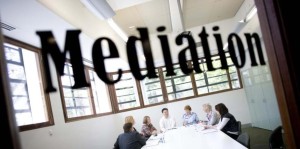

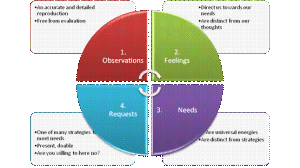


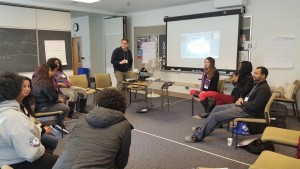
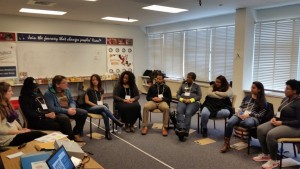
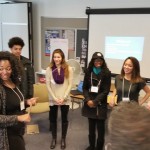
 her King Junior’s birthday happens to be tomorrow, January 15th, and in his honor, on Monday January 18th, the AmeriCorps Project Change team will be participating in the annual Service Fair at the Marriott Convention Center, North Bethesda, run by Volunteer Maryland. It is always a fun day, full of hands on opportunities to pack food parcels, make greeting cards for veterans serving overseas, and sampling some of the other amazing work done by exhibiting Volunteer Organizations.
her King Junior’s birthday happens to be tomorrow, January 15th, and in his honor, on Monday January 18th, the AmeriCorps Project Change team will be participating in the annual Service Fair at the Marriott Convention Center, North Bethesda, run by Volunteer Maryland. It is always a fun day, full of hands on opportunities to pack food parcels, make greeting cards for veterans serving overseas, and sampling some of the other amazing work done by exhibiting Volunteer Organizations. What an amazing morning at Project Change, as we played host to 20 other members of neighboring AmeriCorps programs in Maryland. The energy was palpable and people were truly listening and honoring each others experiences as fellow members of the state of MD AmeriCorps team.
What an amazing morning at Project Change, as we played host to 20 other members of neighboring AmeriCorps programs in Maryland. The energy was palpable and people were truly listening and honoring each others experiences as fellow members of the state of MD AmeriCorps team.
